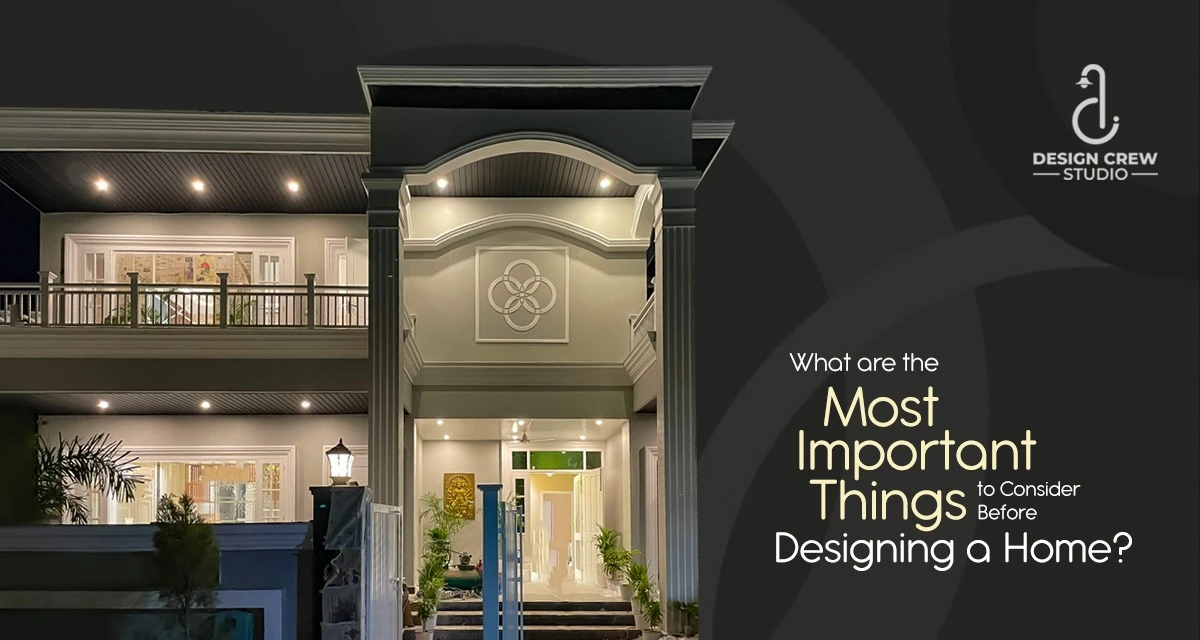Planning a home is fun, but it should be planned carefully. Some factors to consider before designing a house are your lifestyle requirements, finances, the site and orientation, and future flexibility. It all defines how your space will eventually perform. When it comes to home design, it is vital to consider some key aspects at the very beginning so that the design can be both beautiful and practical. These are the things that must be considered before designing a house: layout flow, light, ventilation, energy efficiency, the quality of materials, and structural integrity. And be sure not to omit zoning approvals or long-term options that are key considerations in designing your home, which safeguard your investment. This introduction sets a good background, outlining what to take into consideration before designing a home in order to have a livable home.
What Are the Most Important Things to Consider Before Designing a Home?
1. Specify your way of life and future requirements. How your life is currently functioning is one of the main factors to consider prior to designing a home, and how it may or may not change in five or ten years. The ability to change any space, such as a guest room, into an office is important. This is an Important factors in home design that you should know.
2. Establish an achievable amount of money. Budget dictates it all, and that is size, material, technology, and finish. You do not end up surprised when you define your limit and put contingencies in place. This is one of the most important things to keep in mind when thinking of designing a home to keep plans realistic.
3. Spatial circulation and plan layout. Rooms that are well organized enhance comfort and usability. Think about traffic flows, privacy areas, and open plans as opposed to partitioned ones. One of the significant features in the design of a house is functionality, which leads to daily convenience. Important factors in home design that you should consider while doing so.
4. Select sustainable design options. Materials, insulation, natural ventilation, solar orientation, and water-saving systems should be prioritized. The green features save in the long run and impact. One of the key issues of home designing nowadays is sustainability.
5. Assess your site and orientation. Think of slope, direction of sun, direction of prevailing winds, views, access, and limitations on the site. Light and passive solar gain can be maximized by orientation. This is one of the most important things to note before designing a home.
6. Choose the materials carefully. It matters how long it will last, how it can be maintained, how much it costs, and what environmental effect it has. Products such as low-VOC paints, reclaimed lumber, and stone native to the area will provide the character without the intensive maintenance. Wise choice is one of the factors that should be considered before the design of any home.
7. Be beautiful and practical. Your house must be stylish and functional. Choose the style you like most, whether modern, traditional, or minimalist, and make sure it is functional. Such a relationship plays a significant role in interior design.
8. Include technology and intelligent features. Automation, security system pre-wiring, and efficient HVAC are more convenient and resaleable. Another of the things to consider before designing a home is smart home systems that are becoming an expectation and need to be planned early.
9. Prepare to have accessibility and flexibility. Larger door frames, single floor plans, and universal design aspects enable a person to age in place and live in a more inclusive fashion. Creating flexible spaces no longer requires retrofitting at a high cost.
10. Plan outdoor living. The rooftop gardens, patios, decks, courtyards, and landscaping all expand the area you live in and bind you with nature. There is a great focus on outdoor areas that increase functionality and value.
Conclusion!
The combination of the factors to consider before designing a home will make your space not only beautiful but practical. Careful decisions in terms of location, orientation, budget, layout,
materials, and sustainability create enduring value and livability. Above all, a qualified design team that takes the architect through the engineer, to the interior consultant team, will help
streamline that thinking, address the technical viability, and implement it. Crystal clear vision and professional cooperation will make your home more than just a building; it will be the experience
that will represent your lifestyle, it will evolve with the future, and it will be yours.
Also read: Smart Interior Design Tips for Compact Homes


